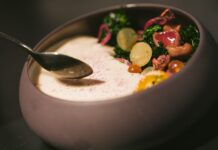Many years ago, in the ancient city of Tochigi, set amidst the rice fields of central Japan, a 6-year-old boy lay deathly ill with tuberculosis. His family was very poor, so when someone told his mother that the only cure was to feed the boy sushi, the mother skipped meals to save money to take him to sushi restaurants every day. Later, penicillin cured the boy, who was left with a lifelong love of sushi and of restaurants. And so, says restaurateur Masanobu Terauchi, “my whole career was started by the sacrifice of a mother.”
It’s a pleasant sunny day and Terauchi – or Chef Nobu, as he is affectionately known to his legions of devotees after more than 30 years as sushi chef in Tulsa and teacher of popular cooking classes since 1989 – stands amidst scaffolding in a vast and modern atrium in what will soon be his newest restaurant. The 8,600-square-foot Zanmai will, of course, serve sushi, but it will also offer dry-aged prime steaks and haute cuisine seafood dishes. One side is punctuated by panels of rough, weather-worn wood, reclaimed cedar blackened with charcoal. “Wabi-sabi,” explains Terauchi, referring to the Japanese aesthetic that finds beauty in age, wear and impermanence. But everything else is stark, elegant and modern. The decor is also somehow quintessentially Japanese, both in its use of space and in elements such as those wood panels, which echo Japanese shoji doors. And this, says Terauchi, pointing south toward a long, glass-walled room with sun streaming in, will be our teppanyaki room. Long, modern tables are grouped around 14 teppanyaki grills – big, flat, iron griddles heated from below. As diners sit and perhaps gape at the spectacular show, a skilled chef will flamboyantly toss, sear and cook a meal tableside. In most restaurants, that would be the main attraction. But not here.
“Come,” calls Terauchi, and he darts away. He’s excited and so fast he’s hard to follow. He’s in another room now, light and airy with an impossibly high ceiling and a wall of tall glass windows showcasing a stunning view of the downtown Tulsa skyline. Suddenly, there’s a beeping as a crane lowers a worker on the east wall where, 35 feet above the floor, he’d been cleaning windows set high above black wood panels. This room is obviously Zanmai’s pride and joy, and it’s where the finest food is served. USDA Prime dry-aged steaks and intricate-yet-harmonious meat and seafood dishes created by Terauchi draw elements from Western and Asian cuisine. There’s black cod with miso sauce and Chilean sea bass with yuzu dressing. There’s beef sashimi and, for humbler palates, a tuna or salmon burger. And, of course, there is sushi.
Sushi is Terauchi’s first love, and – though he opened a noodle shop in Japan and, after he moved stateside in 1977, worked at a succession of Japanese restaurants – he opened Tulsa’s first sushi restaurant, Fuji, in 1986.
“I was a pioneer,” he says. “I educated Tulsans to like sushi.” Back then it wasn’t an easy job. Rather than bullying Tulsans into eating traditional Japanese raw fish concoctions, he chose to entice them by creating an entirely new kind of sushi. A few chefs in California were making a crowd-pleasing kind of maki called a “California roll” with non-traditional ingredients. Terauchi pushed the envelope even farther and created many new rolls of his own – more than 100, he says.
“Zanmai” means luxury, but, Terauchi explains, it is also a Buddhist concept (it comes from the Sanskrit word samadhi) referring to the truth and joy obtained by acting and doing. By his love and creativity with sushi and now with his creation of what will be one of Tulsa’s finest eating places, Chef Nobu is the embodiment of zanmai. 1402 S. Peoria Ave., Tulsa. www.zanmaiok.com

























